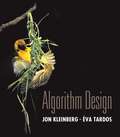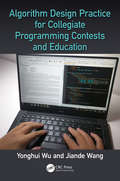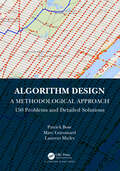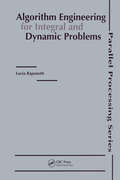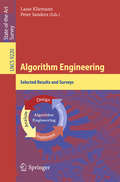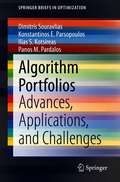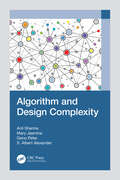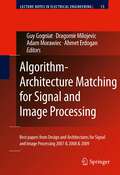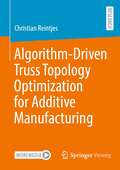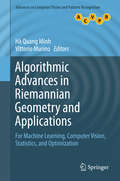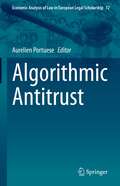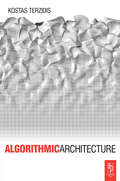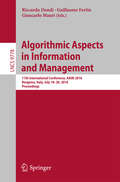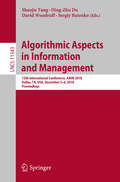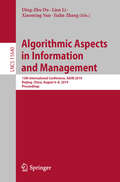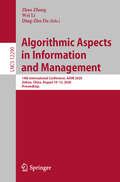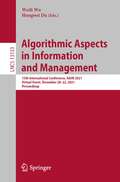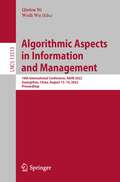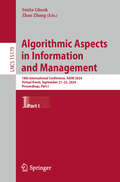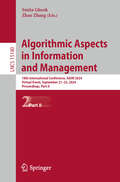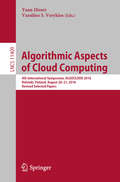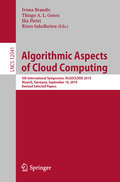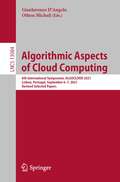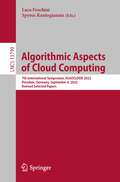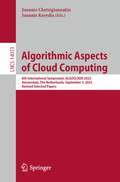- Table View
- List View
Algorithm Design
by Jon Kleinberg Eva TardosAlgorithm Design introduces algorithms by looking at the real-world problems that motivate them. The book teaches students a range of design and analysis techniques for problems that arise in computing applications. The text encourages an understanding of the algorithm design process and an appreciation of the role of algorithms in the broader field of computer science.
Algorithm Design Practice for Collegiate Programming Contests and Education
by Yonghui Wu Jiande WangThis book can be used as an experiment and reference book for algorithm design courses, as well as a training manual for programming contests. It contains 247 problems selected from ACM-ICPC programming contests and other programming contests. There's detailed analysis for each problem. All problems, and test datum for most of problems will be provided online. The content will follow usual algorithms syllabus, and problem-solving strategies will be introduced in analyses and solutions to problem cases. For students in computer-related majors, contestants and programmers, this book can polish their programming and problem-solving skills with familarity of algorithms and mathematics.
Algorithm Design: A Methodological Approach - 150 problems and detailed solutions
by Patrick Bosc Laurent Miclet Marc GuyomardA bestseller in its French edition, this book is original in its construction and its success in the French market demonstrates its appeal. It is based on three principles: (1) An organization of the chapters by families of algorithms: exhaustive search, divide and conquer, etc. On the contrary, there is no chapter devoted only to a systematic exposure of, say, algorithms on strings. Some of these will be found in different chapters. (2) For each family of algorithms, an introduction is given to the mathematical principles and the issues of a rigorous design, with one or two pedagogical examples. (3) For the most part, the book details 150 problems, spanning seven families of algorithms. For each problem, a precise and progressive statement is given. More importantly, a complete solution is detailed, with respect to the design principles that have been presented; often, some classical errors are pointed out. Roughly speaking, two-thirds of the book is devoted to the detailed rational construction of the solutions.
Algorithm Engineering for Integral and Dynamic Problems
by Lucia RapanottiAlgorithm engineering allows computer engineers to produce a computational machine that will execute an algorithm as efficiently and cost-effectively as possible given a set of constraints, such as minimal performance or the availability of technology. Addressing algorithm engineering in a parallel setting, regular array syntheses offer powerful co
Algorithm Engineering: Selected Results and Surveys (Lecture Notes in Computer Science #9220)
by Lasse Kliemann Peter SandersAlgorithm Engineering is a methodology for algorithmic research that combines theory with implementation and experimentation in order to obtain better algorithms with high practical impact. Traditionally, the study of algorithms was dominated by mathematical (worst-case) analysis. In Algorithm Engineering, algorithms are also implemented and experiments conducted in a systematic way, sometimes resembling the experimentation processes known from fields such as biology, chemistry, or physics. This helps in counteracting an otherwise growing gap between theory and practice.
Algorithm Portfolios: Advances, Applications, and Challenges (SpringerBriefs in Optimization)
by Panos M. Pardalos Ilias S. Kotsireas Konstantinos E. Parsopoulos Dimitris SouravliasThis book covers algorithm portfolios, multi-method schemes that harness optimization algorithms into a joint framework to solve optimization problems. It is expected to be a primary reference point for researchers and doctoral students in relevant domains that seek a quick exposure to the field. The presentation focuses primarily on the applicability of the methods and the non-expert reader will find this book useful for starting designing and implementing algorithm portfolios. The book familiarizes the reader with algorithm portfolios through current advances, applications, and open problems. Fundamental issues in building effective and efficient algorithm portfolios such as selection of constituent algorithms, allocation of computational resources, interaction between algorithms and parallelism vs. sequential implementations are discussed. Several new applications are analyzed and insights on the underlying algorithmic designs are provided. Future directions, new challenges, and open problems in the design of algorithm portfolios and applications are explored to further motivate research in this field.
Algorithm and Design Complexity
by S. Albert Alexander Anli Sherine Mary Jasmine Geno PeterComputational complexity is critical in analysis of algorithms and is important to be able to select algorithms for efficiency and solvability. Algorithm and Design Complexity initiates with discussion of algorithm analysis, time-space trade-off, symptotic notations, and so forth. It further includes algorithms that are definite and effective, known as computational procedures. Further topics explored include divide-and-conquer, dynamic programming, and backtracking. Features: Includes complete coverage of basics and design of algorithms Discusses algorithm analysis techniques like divide-and-conquer, dynamic programming, and greedy heuristics Provides time and space complexity tutorials Reviews combinatorial optimization of Knapsack problem Simplifies recurrence relation for time complexity This book is aimed at graduate students and researchers in computers science, information technology, and electrical engineering.
Algorithm-Architecture Matching for Signal and Image Processing: Best papers from Design and Architectures for Signal and Image Processing 2007 & 2008 & 2009 (Lecture Notes in Electrical Engineering #73)
by Adam Morawiec Guy Gogniat Dragomir Milojevic Ahmet ErdoganAdvances in signal and image processing together with increasing computing power are bringing mobile technology closer to applications in a variety of domains like automotive, health, telecommunication, multimedia, entertainment and many others. The development of these leading applications, involving a large diversity of algorithms (e.g. signal, image, video, 3D, communication, cryptography) is classically divided into three consecutive steps: a theoretical study of the algorithms, a study of the target architecture, and finally the implementation. Such a linear design flow is reaching its limits due to intense pressure on design cycle and strict performance constraints. The approach, called Algorithm-Architecture Matching, aims to leverage design flows with a simultaneous study of both algorithmic and architectural issues, taking into account multiple design constraints, as well as algorithm and architecture optimizations, that couldn't be achieved otherwise if considered separately. Introducing new design methodologies is mandatory when facing the new emerging applications as for example advanced mobile communication or graphics using sub-micron manufacturing technologies or 3D-Integrated Circuits. This diversity forms a driving force for the future evolutions of embedded system designs methodologies. The main expectations from system designers' point of view are related to methods, tools and architectures supporting application complexity and design cycle reduction. Advanced optimizations are essential to meet design constraints and to enable a wide acceptance of these new technologies. Algorithm-Architecture Matching for Signal and Image Processing presents a collection of selected contributions from both industry and academia, addressing different aspects of Algorithm-Architecture Matching approach ranging from sensors to architectures design. The scope of this book reflects the diversity of potential algorithms, including signal, communication, image, video, 3D-Graphics implemented onto various architectures from FPGA to multiprocessor systems. Several synthesis and resource management techniques leveraging design optimizations are also described and applied to numerous algorithms. Algorithm-Architecture Matching for Signal and Image Processing should be on each designer's and EDA tool developer's shelf, as well as on those with an interest in digital system design optimizations dealing with advanced algorithms.
Algorithm-Driven Truss Topology Optimization for Additive Manufacturing
by Christian ReintjesSince Additive Manufacturing (AM) techniques allow the manufacture of complex-shaped structures the combination of lightweight construction, topology optimization, and AM is of significant interest. Besides the established continuum topology optimization methods, less attention is paid to algorithm-driven optimization based on linear optimization, which can also be used for topology optimization of truss-like structures.To overcome this shortcoming, we combined linear optimization, Computer-Aided Design (CAD), numerical shape optimization, and numerical simulation into an algorithm-driven product design process for additively manufactured truss-like structures. With our Ansys SpaceClaim add-in construcTOR, which is capable of obtaining ready-for-machine-interpretation CAD data of truss-like structures out of raw mathematical optimization data, the high performance of (heuristic-based) optimization algorithms implemented in linear programming software is now available to the CAD community.
Algorithmic Advances in Riemannian Geometry and Applications: For Machine Learning, Computer Vision, Statistics, and Optimization (Advances in Computer Vision and Pattern Recognition)
by Hà Quang Minh Vittorio MurinoThis book presents a selection of the most recent algorithmic advances in Riemannian geometry in the context of machine learning, statistics, optimization, computer vision, and related fields. The unifying theme of the different chapters in the book is the exploitation of the geometry of data using the mathematical machinery of Riemannian geometry. As demonstrated by all the chapters in the book, when the data is intrinsically non-Euclidean, the utilization of this geometrical information can lead to better algorithms that can capture more accurately the structures inherent in the data, leading ultimately to better empirical performance. This book is not intended to be an encyclopedic compilation of the applications of Riemannian geometry. Instead, it focuses on several important research directions that are currently actively pursued by researchers in the field. These include statistical modeling and analysis on manifolds,optimization on manifolds, Riemannian manifolds and kernel methods, and dictionary learning and sparse coding on manifolds. Examples of applications include novel algorithms for Monte Carlo sampling and Gaussian Mixture Model fitting, 3D brain image analysis,image classification, action recognition, and motion tracking.
Algorithmic Antitrust (Economic Analysis of Law in European Legal Scholarship #12)
by Aurelien PortueseAlgorithms are ubiquitous in our daily lives. They affect the way we shop, interact, and make exchanges on the marketplace. In this regard, algorithms can also shape competition on the marketplace. Companies employ algorithms as technologically innovative tools in an effort to edge out competitors. Antitrust agencies have increasingly recognized the competitive benefits, but also competitive risks that algorithms entail. Over the last few years, many algorithm-driven companies in the digital economy have been investigated, prosecuted and fined, mostly for allegedly unfair algorithm design. Legislative proposals aim at regulating the way algorithms shape competition. Consequently, a so-called “algorithmic antitrust” theory and practice have also emerged. This book provides a more innovation-driven perspective on the way antitrust agencies should approach algorithmic antitrust. To date, the analysis of algorithmic antitrust has predominantly been shaped by pessimistic approaches to the risks of algorithms on the competitive environment. With the benefit of the lessons learned over the last few years, this book assesses whether these risks have actually materialized and whether antitrust laws need to be adapted accordingly. Effective algorithmic antitrust requires to adequately assess the pro- and anti-competitive effects of algorithms on the basis of concrete evidence and innovation-related concerns. With a particular emphasis on the European perspective, this book brings together experts and scrutinizes on the implications of algorithmic antitrust for regulation and innovation.
Algorithmic Architecture
by Kostas TerzidisWhy does the word design owe its origin to Latin and not Greek roots? Where do the limits of the human mind lie? How does ambiguity enter the deterministic world of computation? Who was Parmenides and why is his philosophy still puzzling today? This unique volume challenges the reader to tackle all these complex questions and more.Algorithmic Architecture is not a typical theory-based architectural book; it is not a computer programming or language tutorial book either. It contains a series of provocative design projects, and yet it is not just a design or graphic art book per se. Following the tradition of architecture as a conglomeration of various design fields - engineering, theory, art, and recently, computation - the challenge of this book is to present a concept that, like architecture, is a unifying theme for many diverse disciplines. An algorithm is not only a step-by-step problem-solving procedure, a series of lines of computer codes or a mechanistic linguistic expression, but is also an ontological construct with deep philosophical, social, design, and artistic repercussions. Consequently, this book presents many, various and often seemingly disparate points of view that lead to the establishment of one common theme; algorithmic architecture.
Algorithmic Aspects in Information and Management: 11th International Conference, AAIM 2016, Bergamo, Italy, July 18-20, 2016, Proceedings (Lecture Notes in Computer Science #9778)
by Riccardo Dondi Guillaume Fertin Giancarlo MauriThis volume constitutes the proceedings of the 11th International Conference on Algorithmic Aspects in Information and Management, AAIM 2016, held in Bergamo, Italy, in July 2016. The 18 revised full papers presented were carefully reviewed and selected from 41 submissions. The papers deal with current trends of research on algorithms, data structures, operation research, combinatorial optimization and their applications.
Algorithmic Aspects in Information and Management: 12th International Conference, AAIM 2018, Dallas, TX, USA, December 3–4, 2018, Proceedings (Lecture Notes in Computer Science #11343)
by Ding-Zhu Du David Woodruff Sergiy Butenko Shaojie TangThis volume constitutes the proceedings of the 12th International Conference on Algorithmic Aspects in Information and Management, AAIM 2018, held in Dallas, Texas, USA, in December 2018. The 25 full papers presented were carefully reviewed and selected. The papers deal with current trends of research on algorithms, data structures, operation research, combinatorial optimization and their applications.
Algorithmic Aspects in Information and Management: 13th International Conference, AAIM 2019, Beijing, China, August 6–8, 2019, Proceedings (Lecture Notes in Computer Science #11640)
by Ding-Zhu Du Lian Li Xiaoming Sun Jialin ZhangThis volume constitutes the proceedings of the 13th International Conference on Algorithmic Aspects in Information and Management, AAIM 2019, held in Bejing, China in August 2019. The 31 full papers presented were carefully reviewed and selected. The papers deal with most aspects of theoretical computer science and their applications. Special considerations are given to algorithmic research that is motivated by real-world applications.
Algorithmic Aspects in Information and Management: 14th International Conference, AAIM 2020, Jinhua, China, August 10–12, 2020, Proceedings (Lecture Notes in Computer Science #12290)
by Ding-Zhu Du Wei Li Zhao ZhangThis volume constitutes the proceedings of the 14th International Conference on Algorithmic Aspects in Information and Management, AAIM 2020, held in Jinhua, China in August 2020. The 39 full papers and 17 short papers presented were carefully reviewed and selected from 76 submissions. The papers deal with emerging important algorithmic problems with a focus on the fundamental background, theoretical technology development, and real-world applications associated with information and management analysis, modeling and data mining. Special considerations are given to algorithmic research that was motivated by real-world applications.
Algorithmic Aspects in Information and Management: 15th International Conference, AAIM 2021, Virtual Event, December 20–22, 2021, Proceedings (Lecture Notes in Computer Science #13153)
by Weili Wu Hongwei DuThis book constitutes the proceedings of the 15th International Conference on Algorithmic Aspects in Information and Management, AAIM 2021, which was held online during December 20-22, 2021. The conference was originally planned to take place in Dallas, Texas, USA, but changed to a virtual event due to the COVID-19 pandemic. The 38 regular papers included in this book were carefully reviewed and selected from 62 submissions. They were organized in the following topical sections: approximation algorithms; scheduling; nonlinear combinatorial optimization; network problems; blockchain, logic, complexity and reliability; and miscellaneous.
Algorithmic Aspects in Information and Management: 16th International Conference, AAIM 2022, Guangzhou, China, August 13–14, 2022, Proceedings (Lecture Notes in Computer Science #13513)
by Weili Wu Qiufen NiThis book constitutes the proceedings of the 16th International Conference on Algorithmic Aspects in Information and Management, AAIM 2022, which was held online during August 13-14, 2022. The conference was originally planned to take place in Guangzhou, China, but changed to a virtual event due to the COVID-19 pandemic.The 41 regular papers included in this book were carefully reviewed and selected from 59 submissions.
Algorithmic Aspects in Information and Management: 18th International Conference, AAIM 2024, Virtual Event, September 21–23, 2024, Proceedings, Part I (Lecture Notes in Computer Science #15179)
by Zhao Zhang Smita GhoshThis two-volume set LNCS 15179-15180 constitutes the refereed proceedings of the 18th International Conference on Algorithmic Aspects in Information and Management, AAIM 2024, which took place virtually during September 21-23, 2024. The 45 full papers presented in these two volumes were carefully reviewed and selected from 76 submissions. The papers are organized in the following topical sections: Part I: Optimization and applications; submodularity, management and others, Part II: Graphs and networks; quantum and others.
Algorithmic Aspects in Information and Management: 18th International Conference, AAIM 2024, Virtual Event, September 21–23, 2024, Proceedings, Part II (Lecture Notes in Computer Science #15180)
by Zhao Zhang Smita GhoshThis two-volume set LNCS 15179-15180 constitutes the refereed proceedings of the 18th International Conference on Algorithmic Aspects in Information and Management, AAIM 2024, which took place virtually during September 21-23, 2024. The 45 full papers presented in these two volumes were carefully reviewed and selected from 76 submissions. The papers are organized in the following topical sections: Part I: Optimization and applications; submodularity, management and others, Part II: Graphs and networks; quantum and others.
Algorithmic Aspects of Cloud Computing: 4th International Symposium, ALGOCLOUD 2018, Helsinki, Finland, August 20–21, 2018, Revised Selected Papers (Lecture Notes in Computer Science #11409)
by Yann Disser Vassilios S. VerykiosThis book constitutes the refereed post-conference proceedings of the 4th International Symposium on Algorithmic Aspects of Cloud Computing, ALGOCLOUD 2018, held in Helsinki, Finland, in August 2018. The 11 revised full papers were carefully reviewed and selected from 29 submissions. The aim of the symposium is to present research activities and results on topics related to algorithmic, design, and development aspects of modern cloud-based systems.
Algorithmic Aspects of Cloud Computing: 5th International Symposium, ALGOCLOUD 2019, Munich, Germany, September 10, 2019, Revised Selected Papers (Lecture Notes in Computer Science #12041)
by Rizos Sakellariou Ivona Brandic Thiago A. L. Genez Ilia PietriThis book constitutes the refereed post-conference proceedings of the 5th International Symposium on Algorithmic Aspects of Cloud Computing, ALGOCLOUD 2019, held in Munich, Germany, in September 2019. The 8 revised full papers were carefully reviewed and selected from 16 submissions. The aim of the symposium is to present research activities and results on topics related to algorithmic, design, and development aspects of modern cloud-based systems.
Algorithmic Aspects of Cloud Computing: 6th International Symposium, ALGOCLOUD 2021, Lisbon, Portugal, September 6–7, 2021, Revised Selected Papers (Lecture Notes in Computer Science #13084)
by Gianlorenzo D’Angelo Othon MichailThis book constitutes the refereed post-conference proceedings of the 6th International Symposium on Algorithmic Aspects of Cloud Computing, ALGOCLOUD 2021, held in Lisbon, Portugal, in September 2021. Due to the COVID-19 pandemic the conference was held online. The 4 revised full papers and 1 short paper were carefully reviewed and selected from 11 submissions. The aim of the symposium is to present research activities and results on topics related to algorithmic, design, and development aspects of modern cloud-based systems.
Algorithmic Aspects of Cloud Computing: 7th International Symposium, ALGOCLOUD 2022, Potsdam, Germany, September 6, 2022, Revised Selected Papers (Lecture Notes in Computer Science #13799)
by Spyros Kontogiannis Luca FoschiniThis book constitutes revised selected papers from the refereed proceedings of the 7th International Symposium on Algorithmic Aspects of Cloud Computing, ALGOCLOUD 2022, which took place in Potsdam, Germany, on September 6, 2022.The 6 full papers included in this book were carefully reviewed and selected from 16 submissions. They were organized in topical sections as follows: Cloud-Based Urban Mobility Services; New Results in Priority-Based Bin Packing; More Sparking Soundex-based Privacy-Preserving Record Linkage and Privacy Preserving Queries of Shortest Path Distances.
Algorithmic Aspects of Cloud Computing: 8th International Symposium, ALGOCLOUD 2023, Amsterdam, The Netherlands, September 5, 2023, Revised Selected Papers (Lecture Notes in Computer Science #14053)
by Ioannis Karydis Ioannis ChatzigiannakisThis book constitutes revised selected papers from the 8th International Symposium on Algorithmic Aspects of Cloud Computing, ALGOCLOUD 2023, held in Amsterdam, The Netherlands, on September 5, 2023. The 13 full papers included in this book were carefully reviewed and selected from 24 submissions. They focus on algorithmic aspects of computing and data management in modern cloud-based systems interpreted broadly so as to include edge- and fog-based systems, cloudlets, cloud micro-services, virtualization environments, decentralized systems, as well as dynamic networks.
